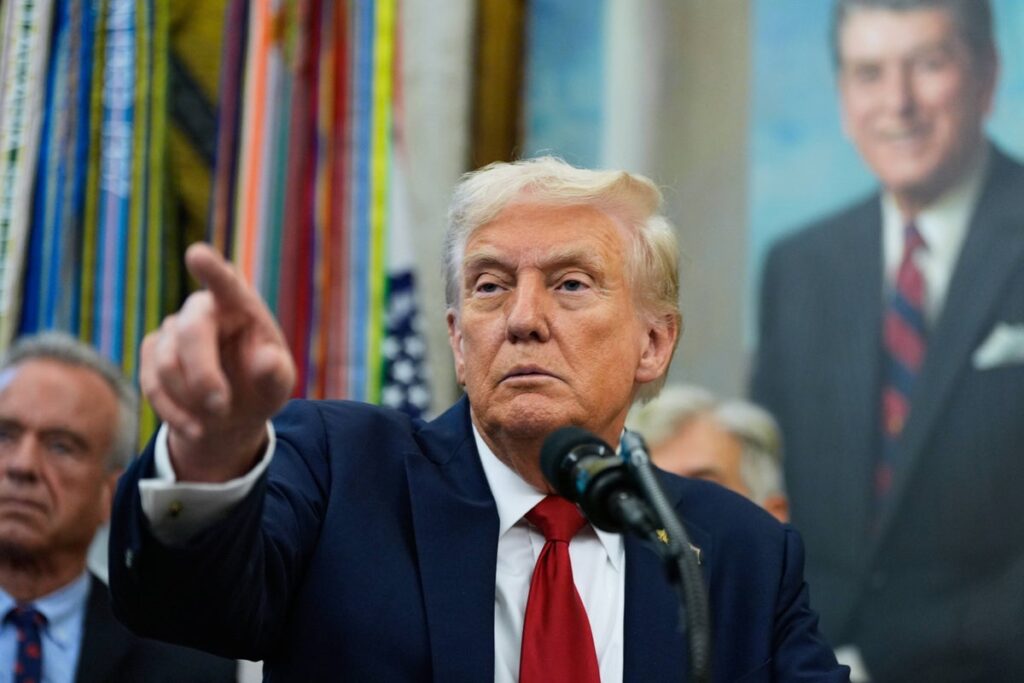
Democratic lawmakers are considering an investigation into President Donald Trump’s repeated assertions that his administration has attracted $17 trillion in foreign and domestic investments. This claim, touted by Trump as a result of his economic policies and global tariffs, has raised eyebrows and skepticism among his political opponents.
President Trump has frequently boasted that the massive influx of investment is due to companies expanding their operations or relocating to the United States. However, these claims have not been substantiated by federal agencies or congressional committees.
Democratic Concerns and Calls for Investigation
Representative Robert Garcia, the leading Democrat on the House Oversight Committee, expressed deep skepticism about Trump’s claims in an interview with MeidasTouch. “Donald Trump is living in a fantasy world,” Garcia stated. “If there is $17 trillion somewhere, the government doesn’t know about it. None of our committees have access to it. Treasury has no idea what the hell he’s talking about. He’s either a liar, or he’s somehow stashed away money in some magical way, and there’s even more corruption happening.”
Garcia hinted at the possibility of an investigation should the president continue to make these unverified claims. “If this keeps going, we’re going to have to investigate where the hell those $17 trillion are,” he added.
Similarly, Representative Eric Swalwell has voiced his concerns, questioning the whereabouts of the alleged funds. “WHY are we in a shutdown?” Swalwell wrote on X, formerly known as Twitter. “Trump says the US has taken in $17 Trillion since he became president. Where is the money? Why haven’t you gotten a check?”
White House Response and Defense
The White House has dismissed these criticisms as unfounded. Kush Desai, a spokesman for the White House, responded sharply to the Democrats’ claims. “This is astonishingly stupid even for a Democrat,” Desai told The Independent. “Instead of calling on the federal government to somehow expropriate trillions in investment commitments by private companies to make and hire in America, Robert Garcia should tell Senate Democrats to just reopen the government.”
President Trump has reiterated his claims on multiple occasions, emphasizing the supposed economic success of his administration. “In just eight months since I took office, we have secured commitments and money already paid for $17 trillion,” Trump declared at the United Nations last month. “Think of it. Four years less than a trillion, eight months much more than $17 trillion is being invested in the United States. And it’s now pouring in from all parts of the world.”
“We’ve taken in almost $17 trillion of investments,” Trump said elsewhere in September. “Most of it is coming because of tariffs.”
Discrepancies and Historical Context
The president’s statements appear to nearly double the White House’s own estimates, which claim $8.8 trillion in investments and commitments under Trump’s tenure. This discrepancy has fueled further debate and scrutiny.
Historically, the U.S. has experienced significant foreign investment inflows, but experts note that such figures are typically measured over much longer periods and involve complex economic factors. The claim of $17 trillion in a matter of months has raised questions about its plausibility and the metrics used to derive this number.
Economists and financial analysts have pointed out that while tariffs can influence investment decisions, they are unlikely to be the sole or primary driver of such a vast sum. The global economic environment, corporate tax policies, and market conditions play significant roles in shaping investment trends.
Implications and Future Outlook
The ongoing debate over Trump’s investment claims highlights the broader political and economic tensions in the United States. As the nation grapples with issues such as government shutdowns and economic recovery, the accuracy and transparency of economic data remain critical.
Looking ahead, any investigation into these claims could have significant implications for the administration and its economic policies. It may also influence public perception and trust in government communications.
As the situation develops, both the administration and its critics will likely continue to engage in a war of words, with each side attempting to sway public opinion and policy decisions.







